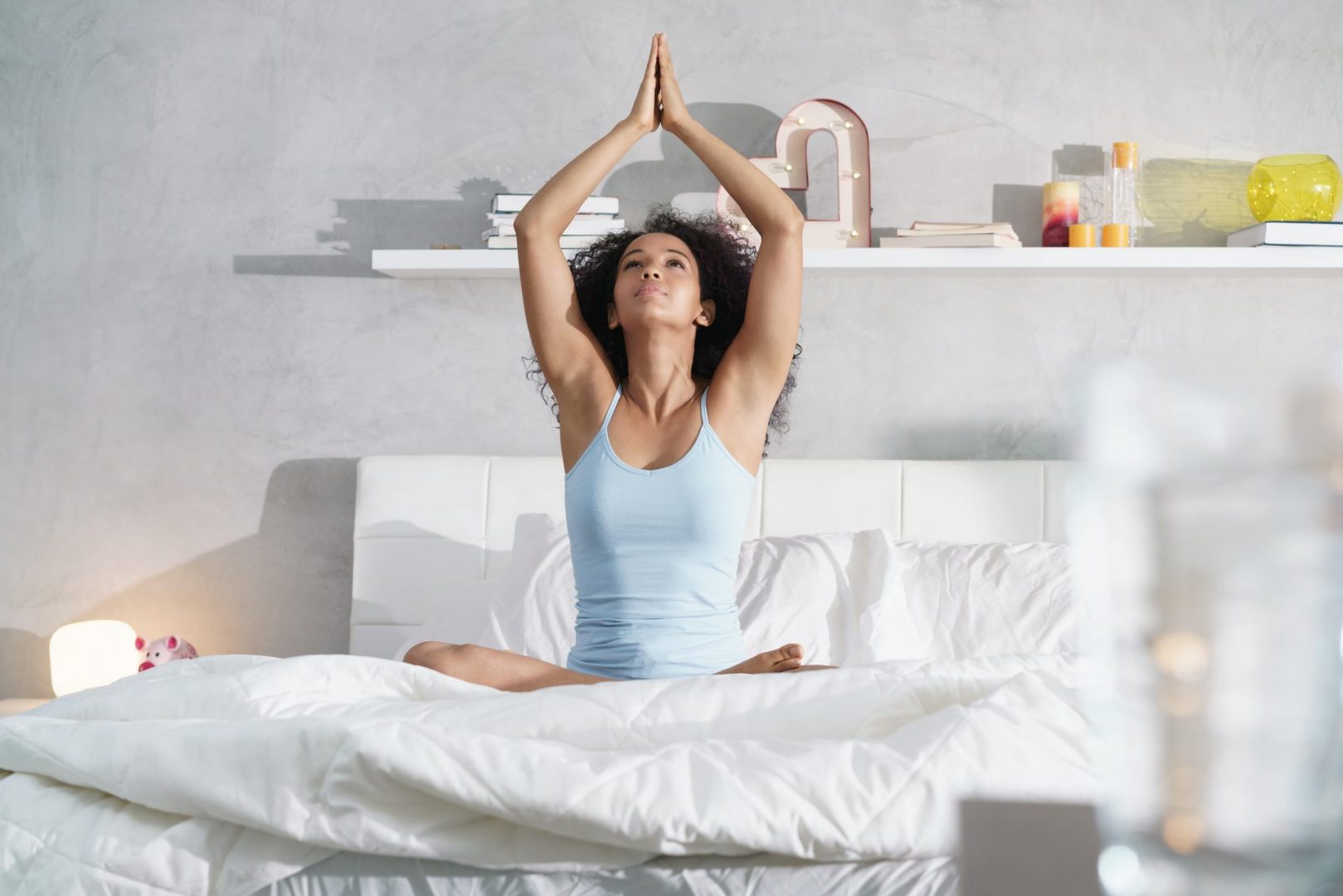Have you ever experienced trouble in falling asleep? You close your eyes but your mind keeps spinning so you cannot fall asleep? Well, sometimes our minds just won’t stop bothering us – and that’s where meditation can help.
To fall asleep, our body and mind need to calm down and relax. Sounds simple, right? However, many people find this utterly difficult to do. Meditation, as a relaxation technique, may help you to quiet your body and mind while enhancing inner peace and balance. This is especially useful when you start focusing on worrisome thoughts at night in bed a time when you are not as easily distracted by other things as during the day.
What is sleep meditation?
Sleep meditation is designed as a guided or unguided experience to foster calm and balance before we go to bed. Keep in mind though, meditation is nothing that can be done in a rush or checked off your bedtime routine like brushing your teeth or washing your face. Meditation needs practice not just at night, but also during the day.
There are multiple courses on sleep meditation that recommend guided online classes during the day to learn how to calm down and to let thoughts pass. This is done in conjunction with a shorter sleep meditation just before bedtime. It’s important to remember that when it comes to meditation, you should not put yourself under too much pressure and expect immediate results. Give yourself and your meditation practice at least 30 days to familiarize yourself with the new technique.
A study published in 2015 analyzed how mindfulness meditation affected 49 older adults with moderate sleep. A standardized mindful awareness practice (MAP) intervention and a sleep hygiene education (SHE) intervention was randomly assigned to the study participants. Participants with the MAP intervention showed significant improvement relative to those in the SHE group on the Pittsburg Sleep Quality Index, which is a metric used to assess sleep quality. The MAP group also showed significant improvement relative to the SHE group on secondary health outcomes of symptoms related to insomnia, depression, and fatigue.
What happens to the body when you meditate?
Meditation lowers the heartrate by activating the parasympathetic nervous system, which is the opposite of the sympathetic nervous system that stimulates the body’s flight-or-fight response. This encourages a slower breathing and hence facilitates falling asleep. Activating the parasympathetic nervous system also increases the level of the inhibitory neurotransmitter called GABA, which acts as the brain’s tranquilizer. This is because GABA reduces the neural excitability and increases slow theta brain waves (which are also present during deep sleep). This generates and strengthens the feeling of calm.
Deep relaxation brought about by meditation also helps counteract physical stress reactions like muscle tension and increased breathing as you learn to relax and control these reactions consciously. Meditation can also lower the release of stress chemicals like adrenaline, noradrenaline, and cortisol into the bloodstream. Meditation has also been seen to enhance the release and the concentration of the sleep-inducing hormone called melatonin which increases the sleep pressure we feel, meaning tiredness and the need to sleep. Hence, this potentially supports falling asleep.
Tips on how to meditate/ sleep meditate
- BREATHING EXERCISES: Control and decelerate your breathing by counting. The idea behind it is not only to calm your breath, but also to take your focus away from your worries or anxieties. Whenever you have difficulty falling back to sleep, consciously scan your body for any areas of tension and begin by counting your breath. As soon as your mind wanders back to troublesome thoughts, bring it back to counting your breath.
- FOCUSING ON THIS MOMENT: Focus on how your body feels at this particular moment, like mindfully sensing where your body touches the ground. Start from the bottom of your body to the top.
- VISUALIZATION: Think of a place/ scene that represents total relaxation for you. Imagine yourself to be in that place of relaxation.
These are just some tips and there are a variety of tips and techniques that help sleep meditation. However, not all of them suit everyone so it is best you give multiple techniques a try and figure out which one works best for you. There are also a lot of resources online that will offer help for people who want to try meditation. Give yourself some time to try it out, practice, and adapt different approaches – again, this may take some time but it may be worth it!
REFERENCES:
https://www.headspace.com/meditation/sleep
Black, D. S., O’Reilly, G. A., Olmstead, R., et. al. (2015). Mindfulness Meditation and Improvement in Sleep Quality and Daytime Impairment Among Older Adults With Sleep Disturbances. A Randomized Clinical Trial. JAMA Internal Medicine. 174(4): 494-501. https://doi.org/10.1001/jamainternmed.2014.8081
Brogaard, B. (2015). How Deep Relaxation Affects Brain Chemistry. https://www.psychologytoday.com/us/blog/the-mysteries-love/201503/how-deep-relaxation-affects-brain-chemistry
Nagendra, R. P., Maruthai, N., & Kutty, B. M. (2012). Meditation and Its Regulatory Role on Sleep. Frontiers in Neurology. https://dx.doi.org/10.3389%2Ffneur.2012.00054
Tooley, G. A., Armstrong, S. M., Norman, T. R., Sali, A. (2000). Acute increases in night-time plasma melatonin levels following a period of meditation. Biological Psychology. https://doi.org/10.1016/s0301-0511(00)00035-1


